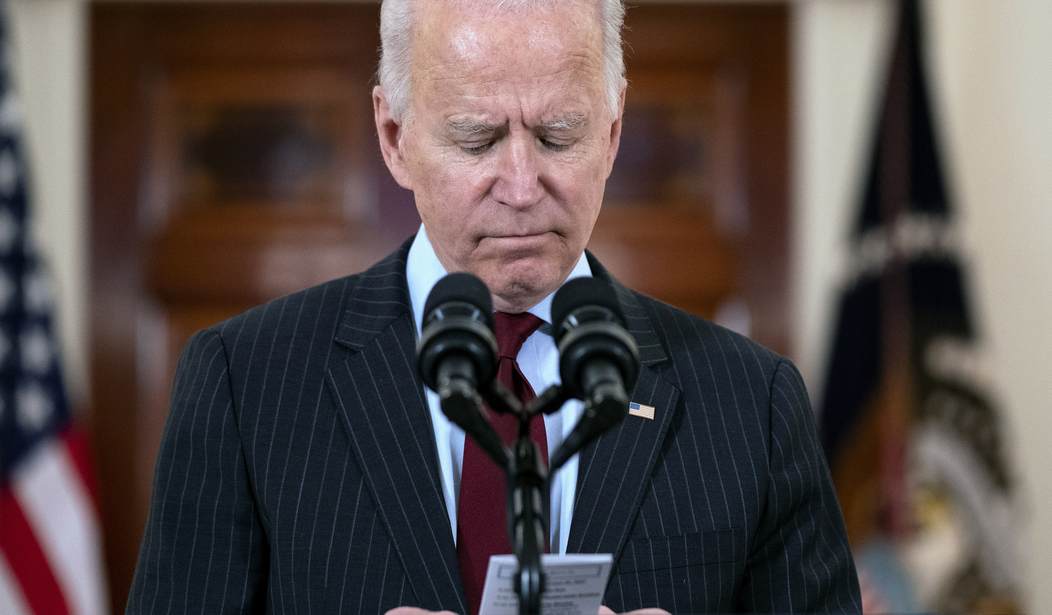The $1.9-trillion stimulus bill that’s inching its way towards Joe Biden’s desk no longer contains a $15-per hour minimum wage, but there’s still an awful lot of pork and giveaways to Democratic allies contained within the bloated piece of legislation. Now a gun control activist and trauma surgeon from Baltimore is calling on Joe Biden to direct COVID-related relief grants to states and cities for “gun violence prevention” efforts.
Dr. Joseph Sakran is a trauma surgeon at Johns Hopkins and an outspoken supporter of new gun control laws, including Biden’s proposed ban on modern sporting rifles. At Scientific American, Sakran and two of his colleagues make their case for redirecting the COVID funds to implement “evidence-based strategies” that they say have been proven to reduce violent crime.
Evidence-based gun violence prevention strategies are already having an impact in cities across the country. In Chicago, community violence intervention programs like READI Chicago and Chicago CRED identify men most at risk of gun violence involvement and connect them with paid transitional jobs, counseling and supportive services. Data from the University of Chicago Crime Lab suggest READI participants are considerably less likely to be shot or killed, and in the Roseland neighborhood of Chicago, where CRED has operated for the last four years, shootings dropped 33 percent in 2020 despite a citywide spike in shootings of 50 percent.
Another promising intervention focuses on reaching high-risk individuals recently admitted to a hospital for treatment of a violent injury. Much like COVID, gun violence is contagious, allowing it to compound and to devastate vulnerable communities. Exposure to gun violence—being shot, shot at or even witnessing a shooting—increases the probability a young person will be involved in violence within two years. Hospital-based violence intervention programs seek to stem the spread of gun violence by screening patients to identify those most at risk and connecting them with trained, culturally competent case managers. An evaluation of one such program in Baltimore found an injury recidivism rate of 5 percent for participating patients, compared to 36 percent for nonparticipants.
When Congress passed the CARES Act in March, some cities used state and local COVID-19 relief funding to support gun violence intervention programs, including Grand Rapids, Mich., and Baton Rouge, La. The American Rescue Plan will provide flexibility for states and cities to do the same. President Biden should champion such efforts, helping to ensure programs are scaled throughout the country and sending a signal that stemming the spike in gun violence is a public safety priority, a racial justice priority and a public health priority.
Now, I don’t actually have an issue with these programs. In fact, I think they’re a much better way of tackling violent crime than slapping more gun control laws on the books and creating new non-violent crimes in the process. If Sakran were callling for these programs to be funded instead of pushing to criminalize the possession of modern sporting rifles or ammunition magazines that can hold more than ten rounds, I might be on board with the idea (though I think that funding should come in a stand-alone bill, not as part of a COVID stimulus measure).
Unfortunately that’s not what Sakran wants. At all.
To be sure, funding gun violence intervention programming is not a replacement for passing legislation to improve firearm safety, or for the array of powerful executive actions President Biden can take on his own. But as America begins to build back from one public health crisis, it’s a critical start to begin addressing another.
I wholeheartedly disagree that funding violence intervention programs is no replacement for new gun control laws. If these programs targeted towards those who are actually responsible for committing violent crimes are more effective and don’t violate the constitutionally-protected rights of legal gun owners, then they should take the place of legislation that will create a host of new, non-violent, possessory offenses out of our right to keep and bear arms.
Sakran talks about “racial justice,” but he knows that those most likely to be arrested and charged with violating the new gun control laws that he wants to put in place are going to be young black and brown men in deep-blue Democrat-controlled cities like Baltimore, not red states or red counties that have proclaimed themselves to be Second Amendment sanctuaries.
Stemming the rise in violent crime should be a priority for every politician, but adding more gun control laws on the books won’t make us any safer. What happened to the crime rate in the United States after the Gun Control Act of 1968 was signed into law, for example? Violent crime continued to soar for the next two decades before it started to decline in the early 1990s.
Targeted deterrence that focuses on both the most likely offenders and victims of violence are effective, and they don’t require a large influx of new spending or new gun control laws. Its simply a matter of shifting tactics; from trying to ban and arrest our way to safety to identifying the most violent and prolific offenders with violence intervention strategies and, if necessary, prosecution and long prison sentences for those who don’t take advantage of the opportunity to change their ways.
If that was the sole strategy of the Biden administration, I’d be fully on board. Unfortunately for gun owners and Second Amendment supporters, Biden and his fellow gun control advocates still believe that gun control is the answer; that if they nullify our right to keep and bear arms that it will have some sort of trickle-down effect on violent criminals. History and common sense tells us that it doesn’t work that way, but history and common sense are no impediments to the disarmament dreams of Democrats in Washington, D.C.









